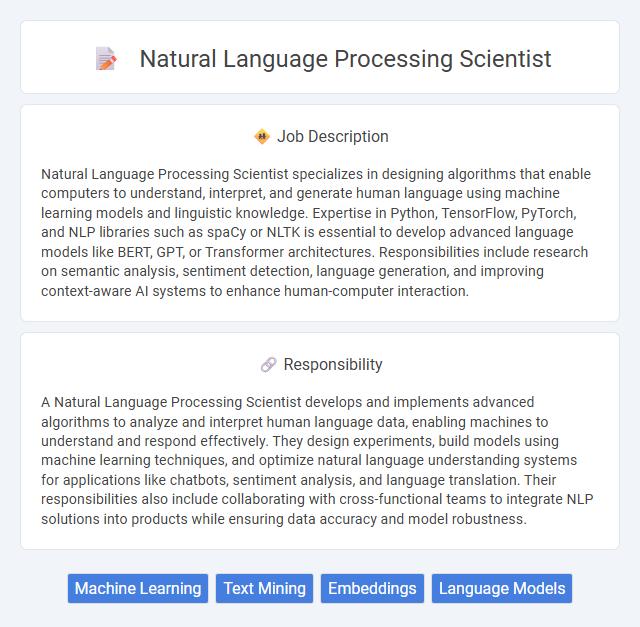
Natural Language Processing Scientist specializes in designing algorithms that enable computers to understand, interpret, and generate human language using machine learning models and linguistic knowledge. Expertise in Python, TensorFlow, PyTorch, and NLP libraries such as spaCy or NLTK is essential to develop advanced language models like BERT, GPT, or Transformer architectures. Responsibilities include research on semantic analysis, sentiment detection, language generation, and improving context-aware AI systems to enhance human-computer interaction.
Individuals with strong analytical skills, a passion for linguistic patterns, and proficiency in programming are likely to thrive as Natural Language Processing Scientists. Those comfortable working with large datasets and developing complex algorithms may find this role well-suited to their abilities. Candidates who enjoy interdisciplinary collaboration and continuous learning are probably more suited to excel in this field.
Qualification
A Natural Language Processing Scientist typically holds a Ph.D. or master's degree in computer science, linguistics, or artificial intelligence with a strong foundation in machine learning and deep learning techniques. Expertise in programming languages such as Python, TensorFlow, PyTorch, and experience with NLP libraries like spaCy or NLTK is essential. Candidates must demonstrate proficiency in designing, implementing, and optimizing language models, along with a solid understanding of statistical methods and natural language understanding algorithms.
Responsibility
A Natural Language Processing Scientist develops and implements advanced algorithms to analyze and interpret human language data, enabling machines to understand and respond effectively. They design experiments, build models using machine learning techniques, and optimize natural language understanding systems for applications like chatbots, sentiment analysis, and language translation. Their responsibilities also include collaborating with cross-functional teams to integrate NLP solutions into products while ensuring data accuracy and model robustness.
Benefit
Natural Language Processing Scientist positions likely offer the benefit of engaging in cutting-edge research that drives advancements in AI and language technology. Professionals in this role probably enjoy collaboration with interdisciplinary teams, fostering innovation and skill development. They also may receive competitive compensation packages and opportunities for career growth within a rapidly evolving field.
Challenge
Natural Language Processing Scientist roles often face the challenge of managing and interpreting vast and complex datasets to improve machine understanding of human language. There is a probable need to develop algorithms that effectively handle ambiguity, sarcasm, and context in diverse linguistic inputs. Balancing innovation with computational efficiency may present ongoing difficulties in advancing NLP models.
Career Advancement
Natural Language Processing Scientists enhance career advancement by mastering machine learning algorithms, deep learning frameworks, and linguistic data analysis to develop advanced AI models. Expertise in programming languages such as Python and experience with NLP libraries like TensorFlow, PyTorch, and spaCy significantly increase job prospects and salary potential. Continuous research, publishing in leading AI journals, and contributing to open-source NLP projects accelerate professional growth and leadership opportunities in AI research teams.
Key Terms
Machine Learning
A Natural Language Processing (NLP) Scientist specializing in Machine Learning develops advanced algorithms to enable computers to understand, interpret, and generate human language. Expertise in deep learning frameworks such as TensorFlow and PyTorch, alongside proficiency in Transformer architectures like BERT and GPT, is crucial for designing models that improve language comprehension and generation tasks. Key responsibilities include data preprocessing, feature engineering, model training, and evaluation to optimize performance on various NLP applications such as sentiment analysis, named entity recognition, and language translation.
Text Mining
Natural Language Processing Scientists specializing in text mining develop algorithms to extract meaningful information from unstructured text data, leveraging techniques such as tokenization, named entity recognition, and sentiment analysis. They utilize machine learning models and deep learning frameworks like Python's NLTK, SpaCy, and TensorFlow to analyze large datasets and improve information retrieval systems. Expertise in semantic understanding, topic modeling, and data visualization is crucial for transforming raw text into actionable insights across industries like healthcare, finance, and social media analytics.
Embeddings
Natural Language Processing Scientists specializing in embeddings develop advanced vector representations that capture semantic meaning from large textual datasets, improving machine learning model accuracy in tasks like sentiment analysis and machine translation. They utilize techniques such as word2vec, GloVe, and transformer-based models like BERT to create dense, contextual embeddings that enhance natural language understanding. Expertise in Python, TensorFlow, or PyTorch combined with experience in large-scale data preprocessing is critical for optimizing embedding performance in real-world applications.
Language Models
Natural Language Processing Scientists specializing in language models develop advanced algorithms to enable machines to understand, interpret, and generate human language effectively. They leverage deep learning techniques, transformer architectures like GPT and BERT, and large-scale datasets to improve model accuracy, contextual understanding, and language generation capabilities. Proficiency in Python, TensorFlow, PyTorch, and experience in fine-tuning pre-trained models are essential for driving innovation in conversational AI and automated text analysis.
 kuljobs.com
kuljobs.com